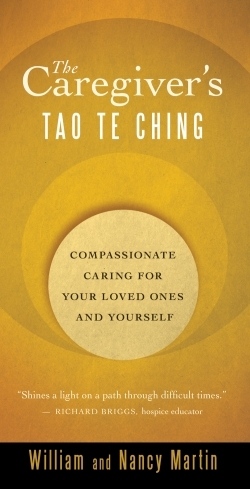The Caregiver's Tao Te Ching
Compassionate Caring For Your Loved Ones and Yourself
How do we embrace the Tao? By holding ourselves with great tenderness.
These words from The Caregiver’s Tao Te Ching distill the wisdom of William and Nancy Martin’s strong and gentle book and give voice to the deepest, and often unspoken, needs of caregivers. Caregivers themselves may feel turmoil as they assist others—facing the long-term needs of a severely disabled person, for example, or navigating end-of-life issues with a dying loved one. With more than sixty-five million Americans providing care for a chronically ill, disabled, or aged family member or loved one, there is a need for the Martins’ interpretation of this timeless wisdom; it can help caregivers find meaning, grace, and growth in their compassionate response to the needs of another.
Lao Tzu, the teacher of Confucius, is thought to have written only 5,000 words in his lifetime, most of them in his Tao Te Ching (“The Book of the Way and Its Power”), a group of eighty-one short, poetic chapters. This Chinese sage, who lived more than 2,500 years ago, recognized that life does not always present an easy path, but has its own twists and turns marked by pleasure and pain, gain and devastating loss; often, it is only with the perspective provided by time that one can see how each experience has contributed its own threads to a beautiful and meaningful tapestry.
The Martins, both Zen practitioners, have interpreted the wisdom and spirit of Lao Tzu’s ancient work to support and encourage twenty-first century caregivers. Like the Tao, caregiving does not evolve in an orderly fashion; there are no easy answers to the questions that inevitably arise. Rather than offering a plan of action, or a set of solutions guaranteed to work in every situation, the Tao demands that one be present to the experience of one’s life, with all its paradoxes and complexity, and that one be willing to take the next simple step even when the rest of the path is yet unclear.
William Martin has been a Taoist scholar for thirty years, and is a counselor, teacher, and author who serves as a teaching guide at The Still Point Center for Zen Practice in Chico, California; his wife, Nancy, has experience as a minister specializing in life transitions and has trained and supported hospice volunteers in their work with the dying and their families. She is the founder of Zen Compassionate Care, an independent, intensive training program that uses Zen awareness practice to aid in the development of caregiving skills.
Reviewed by
Kristine Morris
Disclosure: This article is not an endorsement, but a review. The publisher of this book provided free copies of the book to have their book reviewed by a professional reviewer. No fee was paid by the publisher for this review. Foreword Reviews only recommends books that we love. Foreword Magazine, Inc. is disclosing this in accordance with the Federal Trade Commission’s 16 CFR, Part 255.

